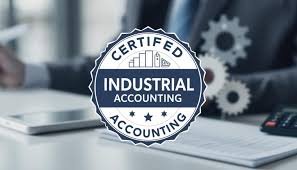Accounting is the backbone of any business, and industrial accounting plays a vital role in managing financial operations effectively. Becoming a Certified Industrial Accountant (CIA) can open up numerous career opportunities in finance, manufacturing, and corporate sectors. In this guide, we will explore everything about the CIA certification, its benefits, and how you can build a successful career in this field.

What is a Certified Industrial Accountant (CIA)?
A Certified Industrial Accountant (CIA) is a professional with specialized expertise in cost management, financial analysis, taxation, auditing, and industrial finance. They help organizations streamline financial operations, reduce costs, and ensure compliance with financial regulations.
Importance of a Certified Industrial Accountant
- Optimizing Business Costs – Helps companies reduce operational costs through effective financial strategies.
- Ensuring Regulatory Compliance – Keeps businesses aligned with taxation and accounting laws.
- Enhancing Financial Decision-Making – Provides insights into financial health and profitability.
- Increasing Career Prospects – Opens doors to high-paying finance and accounting roles.
Key Responsibilities of a CIA
- Preparing financial statements and reports.
- Conducting cost analysis and budgeting.
- Managing taxation and compliance.
- Analyzing industrial financial data.
- Assisting in audit processes.
- Implementing financial risk management strategies.
Skills Required to Become a CIA
- Financial Analysis – Strong understanding of financial statements and cost structures.
- Taxation Knowledge – Expertise in direct and indirect tax regulations.
- Auditing Skills – Ability to assess financial records for accuracy and compliance.
- Data Interpretation – Analytical skills to evaluate business performance.
- Problem-Solving – Ability to identify financial risks and solutions.
How to Become a Certified Industrial Accountant?
To become a Certified Industrial Accountant, follow these steps:
- Complete a Bachelor’s Degree – A degree in accounting, finance, or commerce is recommended.
- Enroll in a CIA Certification Course – Choose a reputed institute offering CIA training.
- Gain Practical Experience – Internships or job experience in industrial finance are beneficial.
- Pass the Certification Exam – Clear the required exams for certification.
- Continue Learning – Stay updated with industry trends and accounting standards.
Eligibility Criteria for CIA Certification
- A Bachelor’s degree in commerce, finance, or accounting.
- Some institutes may require prior work experience in accounting or finance.
- Basic knowledge of financial software and tools.
Top Institutes Offering CIA Certification
- The Institute of Cost Accountants of India (ICAI)
- Association of Chartered Certified Accountants (ACCA)
- National and International Financial Institutes offering industrial accounting courses
Course Structure and Curriculum
A typical CIA certification course covers:
- Financial Accounting – Principles and applications.
- Cost & Management Accounting – Cost control and budgeting.
- Taxation – GST, corporate tax, and income tax.
- Auditing & Compliance – Internal and external audit methods.
- Financial Reporting – Preparing accurate financial statements.
- Business Laws & Ethics – Understanding regulations affecting businesses.
Career Opportunities for Certified Industrial Accountants
- Financial Analyst – Assess financial performance and strategies.
- Cost Accountant – Analyze and control business costs.
- Tax Consultant – Assist businesses with taxation and compliance.
- Internal Auditor – Ensure financial accuracy and compliance.
- Finance Manager – Oversee financial operations in an organization.
- Chief Financial Officer (CFO) – A leadership role managing overall company finances.

Salary Expectations for CIAs
The salary of a Certified Industrial Accountant varies based on experience, location, and company. On average:
- Entry-Level: $40,000 – $60,000 per year
- Mid-Level: $60,000 – $100,000 per year
- Senior-Level: $100,000+ per year
Challenges Faced by Industrial Accountants
- Keeping up with changing tax laws and compliance.
- Managing financial risks effectively.
- Handling large volumes of financial data accurately.
- Staying updated with accounting software and tools.
Future Trends in Industrial Accounting
- AI & Automation – Advanced software automating financial tasks.
- Blockchain Technology – Secure financial transactions and audits.
- Cloud-Based Accounting – Easy access to financial records anytime, anywhere.
- Data Analytics in Finance – Predictive insights for better decision-making.

Conclusion
Becoming a Certified Industrial Accountant (CIA) is a great career choice for those passionate about finance and business strategy. The demand for industrial accountants is growing, and with the right skills and certification, you can secure a high-paying and fulfilling career. By continuously learning and adapting to industry changes, you can stay ahead in the competitive finance sector.
FAQs
1. Is a Certified Industrial Accountant different from a Chartered Accountant?
Yes, a CIA focuses on cost management, taxation, and industrial finance, while a CA has a broader scope covering auditing, taxation, and corporate finance.
2. How long does it take to become a Certified Industrial Accountant?
It typically takes 1-3 years, depending on your educational background and certification program.
3. Can I pursue a CIA certification without an accounting degree?
Some institutes allow candidates from finance or commerce backgrounds, but an accounting degree is preferred.
4. What industries hire Certified Industrial Accountants?
Manufacturing, retail, healthcare, IT, and financial services industries hire CIAs.
5. Is online CIA certification available?
Yes, many institutes offer online certification courses with flexible schedules.
By obtaining a Certified Industrial Accountant (CIA) certification, you can build a strong career in finance and play a crucial role in business success. Whether you are a student, a working professional, or an entrepreneur, this certification can enhance your financial expertise and open up new opportunities.





